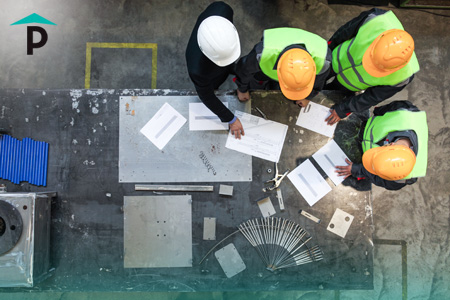Securing the best bid bonds for your company
If you have worked in the construction industry or building trade for any length of time, you’ll know just how important construction bonds are. While bid bonds for construction are required on all federal contracts, the vast majority of private companies require contractors to submit bid bonds too.
Call: (844) 612-7238
In fact, any construction firm will find it difficult, if not impossible, to operate in the industry without using bid bonds. In some areas, these types of surety bonds are required even before you can obtain a license or permit to carry out work.
Due to the importance of bid bonds, it is essential that your company has access to a cost-effective construction bond company. As you will be relying on sureties to bid on projects and work with clients, your entire operation is based on your ability to access bid bonds and other types of construction bonds at attractive rates.
What is a bid bond?
Construction projects are rarely carried out by one company. Instead, a developer will hire a firm of contractors to carry out the work and this firm will hire subcontractors to undertake particular elements of the work. This enables different specialists to work on the project at varying stages and ensures the full range of expertise needed can be accessed.
 It is common practice in the construction industry for companies to bid for a project. If a property developer is building a new shopping mall, for example, construction firms who want to undertake the work will submit a bid. This bid states how much they will carry out the work for.
It is common practice in the construction industry for companies to bid for a project. If a property developer is building a new shopping mall, for example, construction firms who want to undertake the work will submit a bid. This bid states how much they will carry out the work for.
The property developer examines the bids and chooses the contractor they want to work with, usually the company that has submitted the lowest bid. Contracts are then drafted, based on the bid, and signed before work commences.
To prevent contractors from submitting impossibly low bids and then raising their price once the project has been allocated to them, bid bonds are required. Contractors obtain a bid bond from a third party, usually a construction bond company, and this acts as a guarantee that they will complete the project in accordance with the bid they submitted. If they fail to do so, the company that provided the bid bond becomes liable, in accordance with the terms upon which the surety was given.
How much does a bid bond cost?
The cost of bid bond varies. Generally, the price of a bid bond depends on the cost of the project, the company or developer, the performance and financial history of the contractors, the location of the site and the amount of the surety.
For smaller projects, construction bond companies and insurance firms may offer bid bonds on a flat fee basis. In contrast, the cost of bid bonds for larger projects are usually based on a percentage of the surety that is being obtained.
However, different construction bond companies charge different rates. This means that contractors can obtain cheaper bid bonds by choosing the best company or insurance firms for their needs. With help from an experienced surety agency, contractors can ensure they access the best rates for the particular project they want to bid on.
What other types of bonds are used in the construction industry?
Although bid bonds are prevalent in the building trade, other types of construction bonds are widely used too. Contract bonds are similar to bid bonds, for example, but apply to the terms of a contract, as opposed to the terms of a bid. However, they work in the same way and protect the owner of the project in case the terms of the contract aren’t fulfilled by the contractors.
Similarly, performance bonds work in the same way. If the contractors fail to perform their duties in accordance with the contract, the surety covers the project owner’s losses, up to the specified amount of the surety.
Payment bonds are another form of construction bonds that are typically required before your bid will be considered for a project. These offer a guarantee that all relevant parties, such as subcontractors and suppliers, will be paid by a specific deadline.
Although the relevant parties may have contracts with the contractors, rather than the project owners, payment bonds are important to the project owner nonetheless. If relevant parties aren’t paid what they are owed, they could place a lien on the property. By having a payment bond in place, the project owner has a guarantee that relevant parties will be paid and will not, therefore, need to place a lien on the property once the project has been completed.
Negotiating construction bonds
 Although the basic principle behind construction bonds is relatively straightforward, they can be far more complicated in practice. Often, different types of construction bonds are obtained at the same time, from the same construction bond company, so they may be bundled together. Payment bonds and performance bonds are typically obtained together, for example.
Although the basic principle behind construction bonds is relatively straightforward, they can be far more complicated in practice. Often, different types of construction bonds are obtained at the same time, from the same construction bond company, so they may be bundled together. Payment bonds and performance bonds are typically obtained together, for example.
Furthermore, the exact terms of a bond are dependent on the specific project. With subdivision bonds, for example, contractors may have a set amount of time to complete improvements, but this deadline can be agreed upon by the parties.
Due to the variations in bond terms, it is vital that all parties examine the terms of the sureties in detail. Furthermore, each party will want to ensure that the bonds cover their interests.
Securing the best rates for construction bonds
When it comes to contractors’ bonds, securing the best rates is essential. Contractors will be required to obtain numerous bonds if they want to bid on projects and each application process can be complex and time-consuming.
nsurance firms and construction bond companies will often want numerous documents to be provided before they will offer a surety, for example. Fortunately, construction firms and contractors don’t have to handle this inhouse.
By using a trusted surety agent, you can minimize the cost, time and complexity associated with securing construction bonds at the best rates. To learn more, contact Pinnacle Surety now on (844) 612-7238.
Check out Pinnacle Surety on Social Media.
We know it isn’t easy keeping up with industry trends and information—that’s why we’re here to help!
In our effort to support our partner and client initiatives, Pinnacle’s official Social Media channels are now up and running to provide company news, articles, blog updates, insider tips and thoughtful discussion!
We hope you’ll join us by giving Pinnacle a Follow on our Facebook and Twitter accounts and chiming in on the conversation! Have any questions, comments or concerns? Send us a PM on Facebook or give us Tweet at @PinnacleSurety.


